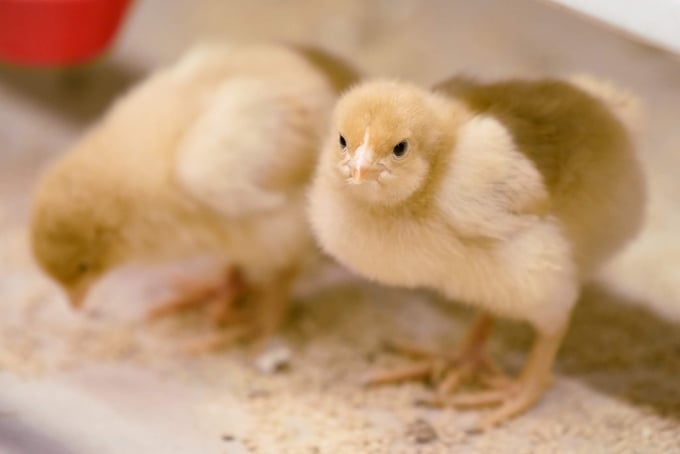June 21, 2025 | 03:34 GMT +7
June 21, 2025 | 03:34 GMT +7
Hotline: 0913.378.918
June 21, 2025 | 03:34 GMT +7
Hotline: 0913.378.918

Ms. Le Thi Hue, Deputy Head of Veterinary Drug Management under the Department of Animal Health, sharing the results of antibiotic resistance prevention and control in 2023. Photo: Tung Dinh.
Ms. Le Thi Hue, Deputy Head of Veterinary Drug Management under the Department of Animal Health, Ministry of Agriculture and Rural Development reported that the Department collaborated with the Ministry of Health to develop and submit to the Government a decision dated 2023 on the National Strategy for Antibiotic Resistance Prevention and Control from 2023 to 2030, with a vision towards 2045.
Furthermore, the Department also formulated and submitted to the Prime Minister a decision on the issuance of a National Plan for implementing key tasks to enhance the capacity of managing, controlling animal diseases, and ensuring the safety of animal source foods from 2023 to 2030.
This plan includes a group of key tasks and solutions aimed at improving the capacity for management, research, production, testing, and insepction of veterinary drugs and vaccines to ensure their quality, safety, and efficacy between 2023 and 2030. It also encompasses monitoring the use of antibiotics and antibiotic resistance.
In addition, draft guidelines for the safe and effective use of veterinary drugs for animals were developed in coordination with experts from universities and research institutes to reduce the risk of antibiotic resistance in livestock production.
Regarding the development of software, Ms. Hue reported that the Department has collaborated with experts from universities and research institutes to draft guidelines for the safe and effective use of veterinary drugs for animals, thereby reducing the risk of antibiotic resistance in livestock production.
Notably, a data management system for veterinary drugs was established with support from the Fleming Fund, the United Kingdom. "This is an online database designed to serve the management of veterinary drugs, the list of authorized veterinary drugs, the status of production, the importation of veterinary drugs, antibiotic raw materials, and the status of antibiotic resistance in Vietnam in a comprehensive and systematic manner," Ms. Le Thi Hue explained.
Regarding monitoring activities, the Department of Animal Health has developed a plan in 2023 and subsequently conducted proactive monitoring for antibiotic resistance prevention with the focus on livestock, including pigs and poultry.
According to Ms. Hue, 15 provinces and cities nationwide have conducted sample gathering, with a total of 2,880 samples and target bacteria such as E. coli, Salmonella, and Campylobacter. These samples were tested for sensitivity to 19 types of antibiotics, and the results will be announced in December.

Numerous collaborative efforts have been made in Vietnam over the past few years with regards to the field of antibiotic resistance prevention and control. Photo: Tung Dinh.
The 2021-2025 national plan for antibiotic resistance prevention and control proposed by the Ministry of Agriculture and Rural Development sets clear objectives to minimize the risk of antibiotic resistance for the community through the management of antibiotic use and control of antibiotic resistance in agriculture in Vietnam.
The plan includes enhancing the capacity for antibiotic and antibiotic resistance management with a focus on policy mechanisms, building a data management system on antibiotics and antibiotic resistance in agriculture, promoting the responsible use of antibiotics livestock, aquaculture, and crop production.
Additionally, the plan aims to annually conduct surveillance to detect antibiotic-resistant bacteria, identify, and warn about the prevalence of antibiotic-resistant bacteria in livestock, aquaculture, and crop production. Consequently, the results will serve as a basis to propose managerial solutions and minimize the risk of antibiotic resistance. The plan also plans for the establishment of at least one central-level reference laboratory for antibiotic resistance in agriculture.
The plan also focuses on improving and implementing good practices in livestock, aquaculture, and crop production to minimize the transmission and spread of antibiotic-resistant microorganisms in production.
Enhancing awareness regarding antibiotic use and antibiotic resistance and strengthening interdisciplinary and international collaboration in research, antibiotic use, and antibiotic resistance prevention using a One Health approach are key components of the plan.
In response to World Antibiotic Resistance Awareness Week, the Ministry of Agriculture and Rural Development (MARD) - the leading agency in the "One Health" partnership framework for disease prevention and control from animals to humans - organized an event on the afternoon of November 18 to advocate collaborative efforts in the prevention and control of antibiotic resistance in agriculture.
The chosen theme for the year 2023 is "Mobilizing public-private collaboration in the prevention and control of antibiotic resistance in livestock production," which aligns with the global call by the World Health Organization for "Collaboration to Prevent Antibiotic Resistance."
Translated by Nguyen Hai Long
![Turning wind and rain into action: [9] Digitizing hydrometeorological data in response to climate change](https://t.ex-cdn.com/nongnghiepmoitruong.vn/608w/files/news/2025/06/17/z6704423696987_15fd32ffc26d590d204d520c9dac6786-nongnghiep-165943.jpg)
(VAN) Farmers have begun accessing hydrometeorological applications to adjust their cropping schedules, aiming to ensure productivity and adapt to climate change.
![Turning wind and rain into action: [8] Real-time salinity detection and early warning technology](https://t.ex-cdn.com/nongnghiepmoitruong.vn/608w/files/news/2025/06/17/z6704423696987_15fd32ffc26d590d204d520c9dac6786-nongnghiep-151127.jpg)
(VAN) Thanks to the integration of modern hydrological-hydraulic models, remote sensing technologies, and artificial intelligence, the accuracy of hydrological forecasting has significantly improved.
![Turning wind and rain into action: [7] Early disaster warnings help marine farmers minimize losses](https://t.ex-cdn.com/nongnghiepmoitruong.vn/608w/files/news/2025/06/17/z6704423696987_15fd32ffc26d590d204d520c9dac6786-nongnghiep-142942.jpg)
(VAN) In recent years, thanks to early disaster warnings and forecasting, marine farmers in Khanh Hoa province have been able to reduce risks and losses, thereby improving production efficiency.
![Turning wind and rain into action: [6] ‘Four on-the-spot’ disaster management software](https://t.ex-cdn.com/nongnghiepmoitruong.vn/608w/files/news/2025/06/17/e5a48259d6a262fc3bb3-nongnghiep-183800.jpg)
(VAN) By simply activating the scenario on the disaster management software, the relevant authorities immediately know how many households need to be evacuated, where to evacuate them to, and by what means of transportation…
![Turning wind and rain into action: [5] Hue applies modern technology in disaster forecasting](https://t.ex-cdn.com/nongnghiepmoitruong.vn/608w/files/news/2025/06/17/z6704423696987_15fd32ffc26d590d204d520c9dac6786-nongnghiep-093938.jpg)
(VAN) In Hue city, modern technology has recently been applied in meteorological and hydrological forecasting and warning, helping to reduce the damage caused by natural disasters.

(VAN) A cutting-edge farming technique being implemented on an experimental ranch in Arizona's Sonoran Desert has already saved a billion gallons of water over five years, according to Civil Eats.

(VAN) Poultry and pig production and the environment can be boosted through enhanced water technology, according to new research.